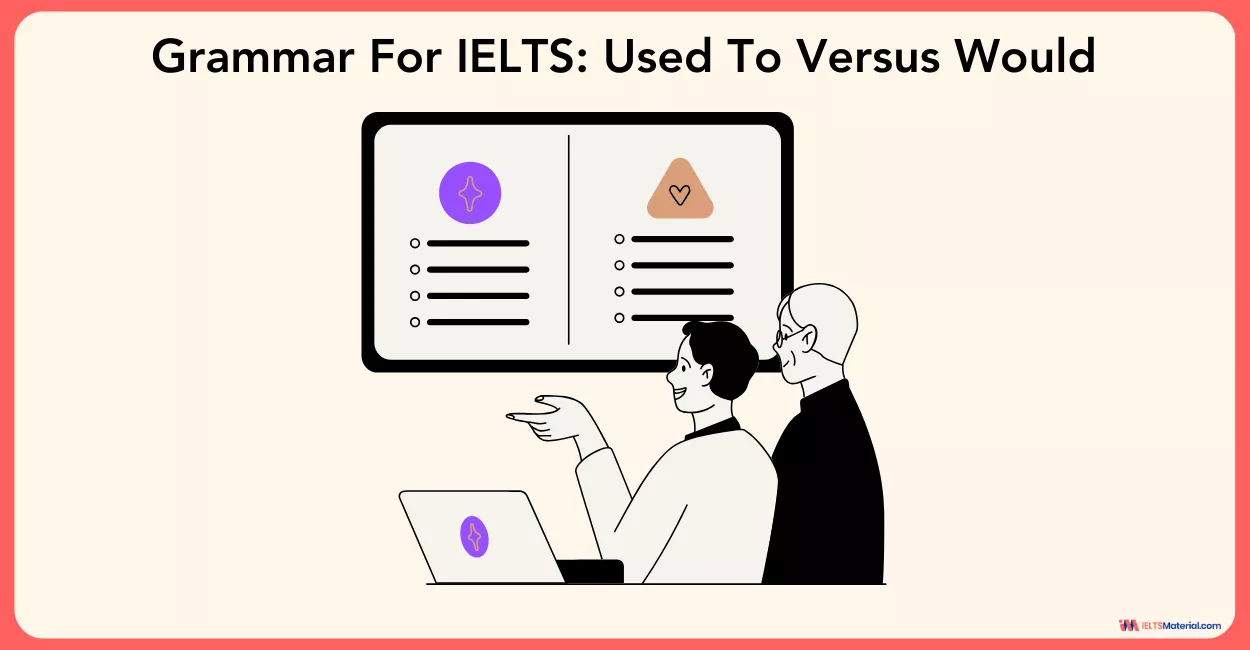Grammar For IELTS: Used To Versus Would
Confused between used to, would, and be/get used to? This guide explains their forms, meanings, and differences with examples to improve your IELTS Writing & Speaking grammar accuracy and boost your band score.
Table of Contents

Limited-Time Offer : Access a FREE 10-Day IELTS Study Plan!
Expressing past habits and states in English can be tricky, especially for IELTS learners. Many candidates confuse “used to”, “would”, and “be/get used to”. Knowing how to use these structures correctly will not only improve your grammar accuracy but also make your IELTS Writing and Speaking more natural and fluent.
This guide explains their forms, meanings, differences, and practical examples to help you master them.
Form and Meaning of "Used to"
The structure used to + infinitive is common when talking about things that happened regularly in the past but no longer happen.
The Structure of "Used to"
- Form: used to + infinitive
- Examples:
- It used to take me over an hour to get to work.
- Supermarkets didn’t use to be open on Sundays in Britain.
- Did you use to get free lunch at school?
Note: In questions and negatives, we use didn’t use to / did you use to.
"Used to" vs. "Be/Get Used to"
Learners often confuse these two structures, but they have different meanings.
- used to + infinitive = past habit/state
- I used to exercise every morning. (= I exercised regularly in the past.)
- be/get used to + verb-ing = become accustomed to something
- He wasn’t used to living on his own. (= He wasn’t accustomed to it.)
- We are getting used to the new technology. (= We are becoming accustomed to it.)
Want to improve your grammar? Get the newly launched IELTS Grammar book today!
Expressing Past Habits
Both “used to” and “would” describe actions that happened regularly in the past but no longer happen now.
- Jack used to wake up early every Monday. (Now he doesn’t.)
- We would get up early every Sunday to go to church. (We don’t now.)
When to Use "Would" for Habits
We usually add a time reference to avoid confusion:
-
I would talk to him about the scholarship in the days before he passed his test.
Note: would cannot be used to talk about past states, only past actions.
Struggling with grammar for the IELTS? Sign up for our online class & master the words to succeed!
Expressing Past States
The phrase “used to” is especially useful for describing past situations or conditions that no longer exist.
- Lithuania used to be part of the Soviet Union. (It isn’t now.)
- There didn’t use to be any crime around here in the old days. (Now there is.)
Why Not Use "Would" for States?
Unlike used to, the structure would cannot describe states.
- Incorrect: France would be a monarchy, but now it’s a republic.
- Correct: France used to be a monarchy, but now it’s a republic.
Quick Comparison Table
Here’s a simple table to make things clearer:
| Structure | Function | Example | Can Describe States? |
|---|---|---|---|
| Used to + infinitive | Past habits & past states | I used to play football. / I used to live in Paris. | Yes |
| Would + infinitive | Past habits (often storytelling) | We would eat out every Friday night. | No |
| Be/Get used to + verb-ing/noun | Be or become accustomed to | She is used to living alone. | Not about past habits |
Feeling stuck with IELTS Grammar? Register for our webinar and unlock your potential today!
Common IELTS Speaking Examples
Here are some IELTS-style examples of how you can use these structures naturally:
- I used to read comic books a lot when I was a child, but now I prefer online blogs.
- When I was in school, we would spend hours playing cricket after class.
- At first, I found IELTS Listening difficult, but now I am getting used to the test format.
Using a mix of these expressions will show examiners that you have a wide grammar range, which is essential for a Band 7.0 or above in IELTS Speaking.
Explore our IELTS eBook store for top-rated books curated by experts. Buy now & elevate your IELTS preparation!
To summarize , mastering“used to”, “would”, and “be/get used to” is essential for clear and accurate communication in English. While used to covers both past habits and states, would is only for past habits, and be/get used to expresses familiarity with something. By using these correctly in your IELTS Writing and Speaking, you’ll sound more natural, demonstrate grammatical range, and move closer to achieving your target band score. Keep practicing with real-life examples to make these structures second nature. For those aiming for top scores, following the IELTS Exam Preparation Tips for Band Score of 8+ can further enhance your vocabulary and overall test performance.
Also Check:
- 10 Useful IELTS Speaking Tips to Impress the Examiner
- Grammar For IELTS: Expressions Of Quantity
- Grammar For IELTS : The Common Grammars And Sentence Structures In English (Part 1
- Grammar For IELTS : The Common Grammars And Sentence Structures In English (Part 2)
- Using Contrast in IELTS Speaking & Writing: Advanced Grammar in IELTS
- 100+ Advanced Vocabulary Word List for IELTS (PDF Available)
- Especially vs Specially for IELTS Grammar: Lessons, Examples, Usage & Exercises

Start Preparing for IELTS: Get Your 10-Day Study Plan Today!
Recent Articles

Nehasri Ravishenbagam

Prity Mallick

Kasturika Samanta





Post your Comments